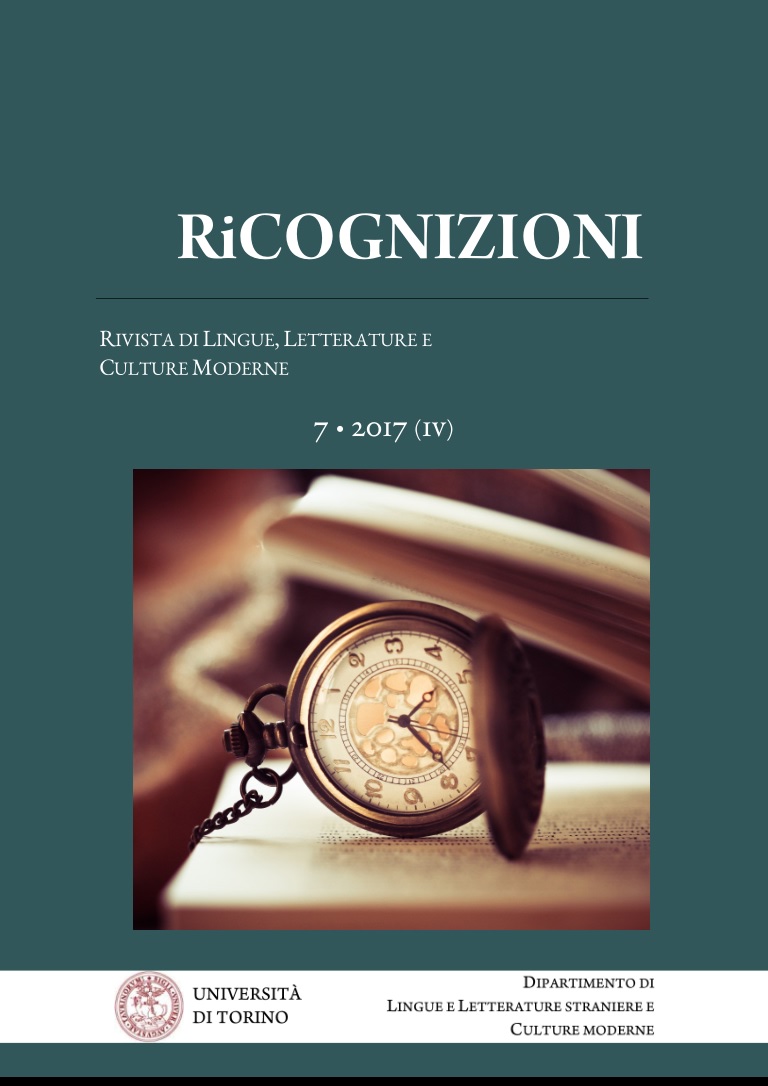Avant-garde, Rearguard and Apocalyptic Aesthetics in Ionesco
DOI:
https://doi.org/10.13135/2384-8987/2137Parole chiave:
apocalyptic aesthetics, experience of obsolescence, theatrical machinery, post-figurative, the avant-garde/rearguard paradoxAbstract
The study centres upon what I call the apocalyptic or rather post-apocalyptic aesthetics of Ionesco’s theatre, focused on an experience of weariness, of obsolescence, and of the reiterated dramatic (and existential) end. The theatre-making techniques, the various (anti)aesthetics of the avant-garde, the different artistic fashions and ideologies that impregnate the literary and the dramatic writing follow, in Eugène Ionesco’ vision, a kind of spectacular-agonistic, catastrophic route. The tragicomic, dramatic, or even melodramatic tension emerges, in Ionesco's work, from an avalanche of post-conflictual moments, in which every intrigue contradicts or even deconstructs the previous one. The catastrophic vision of the cavalcade of miraculous and inexplicable ends (or beginnings) is a symptom of an exacerbated type of “pure”, self-reflexive theatricality. The theatrical machinery therefore functions under the sign of an eternal aesthetic epilogue: it is emphatically post-linguistic, post-psychological, post-ideological, non- or rather post-figurative. A symptomatic aesthetic paradox is that the rearguard makes the avant-garde experiments visible and archivable.Riferimenti bibliografici
Hutcheon, L. (2001), The Politics of Postmodernism, 2ème édition, London & New York, Routledge.
Ionesco, E. (2008), Destellos y teatro / Sclipiri și teatru, édition bilingue, Mariano Martín Rodríguez (éd.), Madrid, Espiral/Fundamentos.
Ionesco, E. (1996), Entre la vie et le rêve. Entretiens avec Claude Bonnefoy, Paris, Gallimard.
Ionesco, E. (1966), Notes et contre-notes, Paris, Éditions Gallimard.
Ionescu, E. (1992), Război cu toată lumea. Publicistică românească, t. I, ediţie îngrijită şi bibliografie de Mariana Vartic şi Aurel Sasu, Bucureşti, Editura Humanitas.
Latour, B. (1991), Nous n’avons jamais été modernes. Essai d’anthropologie symétrique, Paris, La Découverte.
Lemarchand, J. (1954), Préface, in Eugène Ionesco, Théâtre, Paris, Gallimard.
Lyotard, J. F. (1988), Le Postmoderne expliqué aux enfants. Correspondance 1982-1985, Paris, Éditions Galilée.
Pavel, L. (2016), Ionesco. L’antimondo di uno scettico, traduzione di Maria Luisa Lombardo, prefazione di Irina Petraş, Roma, Aracne Editrice.
##submission.downloads##
Pubblicato
Come citare
Fascicolo
Sezione
Licenza
Gli autori che pubblicano su questa rivista accettano le seguenti condizioni:- Gli autori mantengono i diritti sulla loro opera e cedono alla rivista il diritto di prima pubblicazione dell'opera, contemporaneamente licenziata sotto una Licenza Creative Commons - Attribuzione che permette ad altri di condividere l'opera indicando la paternità intellettuale e la prima pubblicazione su questa rivista.
- Gli autori possono aderire ad altri accordi di licenza non esclusiva per la distribuzione della versione dell'opera pubblicata (es. depositarla in un archivio istituzionale o pubblicarla in una monografia), a patto di indicare che la prima pubblicazione è avvenuta su questa rivista.
- Gli autori possono diffondere la loro opera online (es. in repository istituzionali o nel loro sito web) prima e durante il processo di submission, poiché può portare a scambi produttivi e aumentare le citazioni dell'opera pubblicata (Vedi The Effect of Open Access).








